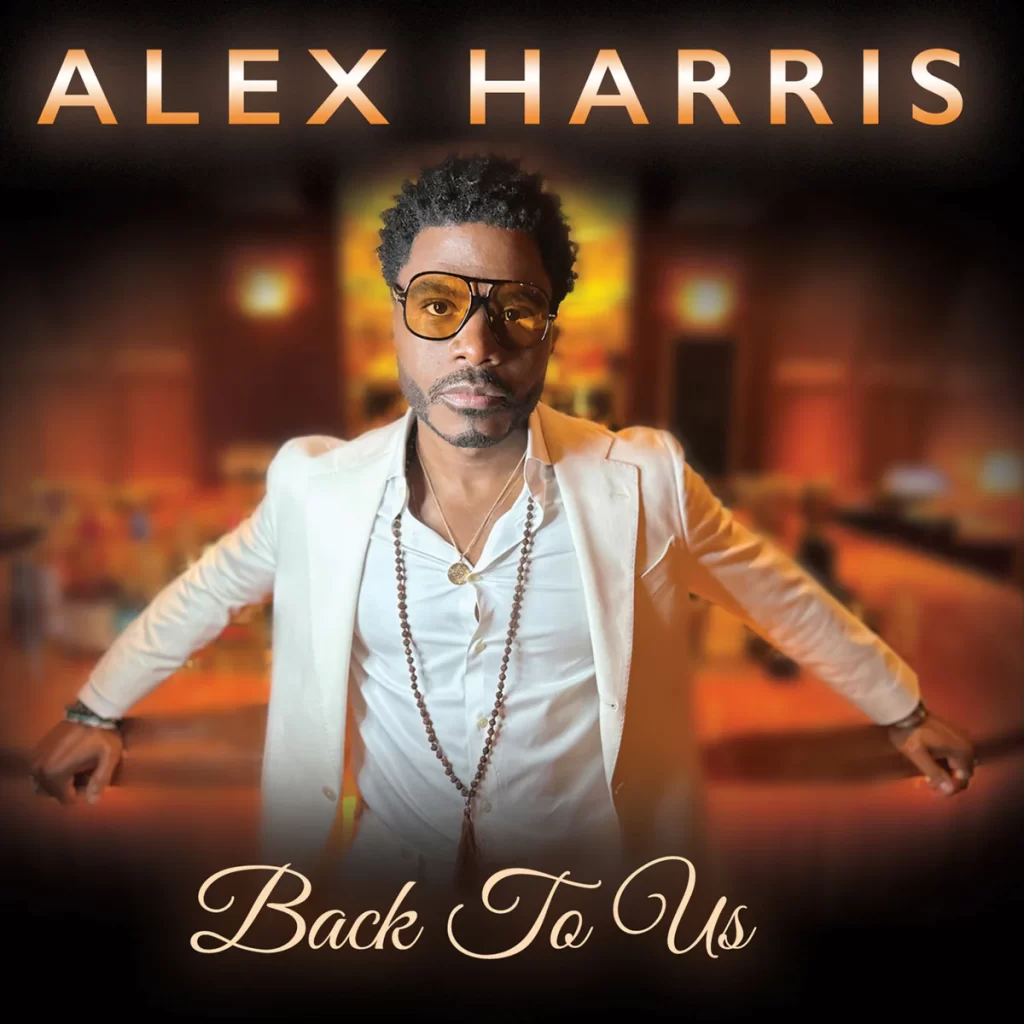“I think I am who I am today because of what I was yesterday.”
At 43, Alex Harris is releasing his first solo album recorded in Nashville for Shanachie Records. There are six originals on Back to Us. A cover of Otis Redding’s “I’ve Got Dreams to Remember” transports the listener back six decades to when soul had, well, real soul. Plus, there’s a cover of Solomon Burke’s “Cry to Me.” The originals stand tall alongside these two legacy songs.

“Otis Redding and I share the same birthday,” explains Alex. “So, there’s a connection on the Georgia soul. I was reluctant to do that song at first. It was brought to me actually by the label, and I didn’t want to do it because most of the record and the songs and the stories that I’m telling are more about life in a more positive light.
“This song talks about a guy finding out his girl was cheating on him. The song spoke to the challenges we have in life and the things that come to us, our willingness to stick to it and to persist beyond the challenges, the heartbreak, the hurt, the pain — and basically see all that as part of the story, to see it better and to make it better than the various situations we are faced with.”
Articulate? This man has a bachelor’s degree in arts in human services and psychology and a master’s in theology and social work. He did an extended graduate study in adolescent counseling at Harvard University, and recently finished his doctorate in organizational leadership at Nova Southeastern University in Florida. He grew up one of eight boys in a highly educated family and toured the world as a youngster in a family band initially known as the A-Boys, since six of his siblings’ names began with the letter “A.” They became A-7. The seventh sibling symbolized the presence of God. They traveled around the country performing mainly in churches.
When Alex sat down and thought about “I’ve Got Dreams to Remember,” he saw the glimmer of hope in this number that clinched Otis Redding’s legacy for more than the half century since he died.
“This was my back story, interpreting the song and bringing such actions. I wanted to not only sing the lyrics of the song, but also bring the feeling that we will go through hurt. We will go through pain. We will go through losses, disappointments, but if we have stick-to-it-iveness and he brings that light. ‘I want you to stay, and I still love you anyway.’ He realizes there is something beautiful in the most disappointing hurting experience that one could ever experience at this moment.”
His parents were educators who played soul at home. And their father toured with his sons when they were still kids. “I started with my brother, and we started gospel, to be more specific. As time evolved, he (Dad) had aspirations for some of us to do different things. We had minimal success if you will. We charted on Billboard. We traveled around the United States, Canada and some international as well, and I started to do a little outside of that. We’d always been on the edge. We were never traditional gospel. We coined the title Inspirational Urban Soul. That’s what we called our interpretation and introduction to the music industry because it wasn’t Take Six. It wasn’t the Waymores.
“It was a little bit more cutting edge, and so we knew our place was a very unique place. While we had some success, it was still somewhat challenging to really find our footing. When we were in college, we tested ventures but a little more to other areas learning about classical music and learning about other genres and that led to my understanding of soul music, jazz, gospel and blues and maturation of all that. And I said, ‘I’m already all of that.’
“Back to Us is a contemporary take on inspirational urban soul. Otis Redding, Sam Cooke and Ray Charles were tone-setters, if you will – or context creators. And I think that our perception evolved from that place. If they would have been around a little while longer, I think our perception would have slightly shifted in how we hear and interpret soul music today. That’s just my way of thinking. I think Ray Charles’ contribution really didn’t shift from his core.
“Everyone needs a solid foundation, and my upbringing in the rural community gospel church not listening to anything other than gospel, basically contemporary, was what they call contemporary Christian music. So, that alone became a great foundation for me in understanding. I think it’s a grounding and the gospel you think about is soul music or R&B music – that comes from gospel, blues and jazz.”
While his parents only played gospel and soul at home, Alex and his brothers would sneak listens to country music on the car radio when they went shopping with their mom. “I thought Shania Twain was very (good) in how she interpreted music and wrote her stories which inspire the way I tell stories as well; the combination, understanding that country and western and blues all that post-Civil War very much is coming from the same place as experiences when we start to write what we hear today.”
Alex’s take on “Cry to Me” shimmers with the respect he has for the soul legacy. “I had a chance to meet Solomon Burke in Chicago. Such a nice person. He gave a great performance I never forgot. (He sat) in his chair and gave out 24 clusters of roses to everybody. I think to do that song and the original recording as well was very amazing to understand and bring my own exposure to that. To hear Solomon Burke was absolutely amazing.”
On the 11 cuts, six are written or co-written by Alex. He gets lost in the reverie of romantic love with the same obsession he must have felt as a child in church. It’s as if he’s channeling Otis Redding. He delivers each number as though it were the first time he’d sung the songs, completely overcome by the object of his affections.
I can see why he resisted doing the Otis Redding cover in that it’s the one song on the album where he doesn’t get the girl. All of his lyrics are addressed directly to his lover. As a listener we’re just standing beside him as he gets on bended knee. The arrangements complement his vocals and take us back to a time when women were adored not as equals but as more than equals.
I asked Alex if he thought being African-American helps or hinders his music in terms of the pain that is expressed in a lot of soul music. “I think it helps. Even though I came up in a sheltered environment and both parents are present and both parents are exposed to the world, we were exposed to the town people as kids. I think what we experienced, participated in, and observed over time contributes to my interpretation of the past that I have shared both in music and in my work in philanthropy.” Alex started the Arts Conservatory for Teens in 2012. With its headquarters in St. Petersburg, Florida, ACT uses the arts to serve underprivileged and at-risk communities.
“I think again generally society contributes to what we think of ourselves. We are ourselves basically in what is portrayed and what IS for us and what ISN’T for us. No one necessarily today has a sign that says ‘black water fountain’ or ‘white water fountain’ or anything for a man or woman necessarily, but there are societal norms for literacy that are imposed on us that make us more literate about the symbolisms that exist and speak harder than the verbals, the audibles.”
The album drops this Friday (April 12th.) A tour is in the planning stages, and he’s already working on a follow-up release.

